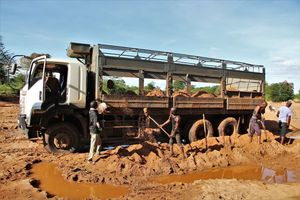Homa Bay seeks to end rampant illegal sand mining

Residents of Kabonyo Village in Rachuonyo North Sub County at a scene where a 15-year-old boy died while harvesting sand.
What you need to know:
- Ruined roads and deep gullies are the telltale signs of a trail of destruction left behind by sand harvesters.
Sand mining is one of the main economic activities for some families in Rachuonyo North, Homa Bay County. The soil is excavated and sold to construction companies in Homa Bay and other parts of South Nyanza.
Ruined roads and deep gullies are the telltale signs of a trail of destruction left behind by sand harvesters.
During sand harvesting, some people dig the ground and destroy utility lines such as electricity poles and water pipes.
In October, some parts of Central Karachuonyo were plunged into darkness for a week after five electricity poles fell. The poles had been weakened by illegal sand mining.
Rachuonyo G.K. Prison was among areas that were affected by the power supply interruption.
Senior Superintendent of Prisons John Onyango, who is in charge of the correctional facility, said it was one of the most delicate moments for his officers, who had to increase vigilance to avoid a jail break.
Although the prison has a backup generator, Mr Onyango said electricity is the most efficient source of providing light at the facility at night.
“Areas that do not have light are prone to crime. Having a blackout for a week puts us in a quagmire because inmates may attempt to escape,” he said, blaming illegal sand mining for the power outage.
Sand harvesters are also reported to be digging up graves and reburying bodies in different locations.
Some of the sand pits have left huge gullies filled with water and have reeds growing in them.
But this might soon become a thing of the past after the Homa Bay County government came up with a draft policy that seeks to regulate sand mining.
County Director of Mining and Excavation of Mineral Resources Francis Odalo said: “We are concerned about environmental conservation and as a department, we have come up with a policy to address the sand harvesting menace,” Mr Odalo said.
The policy seeks to regulate sand harvesting, quarrying and related activities in the county, and to ensure sustainable exploitation and utilisation of land. It requires the registration of sand dealers and harvesting associations, designate sand harvesting areas, sand harvesting hours and sand transportation methods.
It also provides for the institutional framework for the management and regulation of sand harvesting as well as rehabilitation and protection of the environment from harmful effects of sand harvesting and related activities.
Meanwhile, residents in areas where sand is excavated are expected to benefit from revenue collected from sand harvesting as well as participate in excavation.
A team comprising the executive and Environment chief officer will be appointed to oversee the mining activity.
Other officials include two representatives of special interest groups and a representative of the sand harvesting association.
The committee is required to maintain and update a register of all sand dealers and harvesters’ associations and advise the county on the structure and operations of sand harvesting and related activities.
Further, MCAs are required to vet and approve the list of sand harvesting associations and ensure full participation of the community, including all interest groups.
An association should be composed of three representatives of riparian landowners and two elders who are not riparian land owners, among other individuals.
The policy requires only adults residing within the local community to be employed as sand loaders. Licensed sand dealers should pay a negotiated and agreed wage to sand loaders, who are required to organise themselves into groups.
Other directives include time for sand harvesting, with the policy stating that excavation should be during the day and transportation done through designated roads.
The policy adds that whoever contravenes the requirements will be liable upon conviction to a fine not exceeding Sh50,000 or an imprisonment term not exceeding one year, or to both.
According to Mr Odalo, the policy has been passed by the executive and forwarded to the county assembly for debate.
“We aim at safeguarding both the community’s safety and the region’s environmental health by imposing clear guidelines on sand mining activities,” he says.





